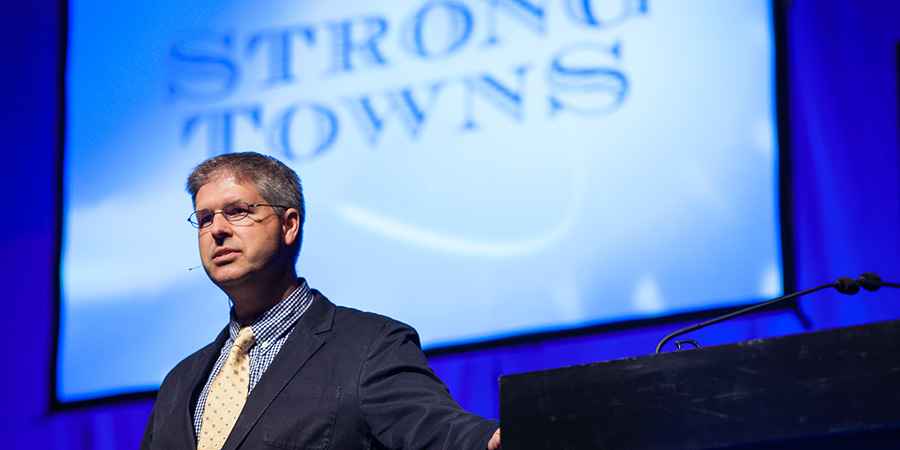
The leader of an organization that educates American communities on the benefits of smart planning believes that desirable urban communities can play a role in promoting rural land conservation.
“When we develop great places people want to live in that are financially productive, they use less land and they use it in a more intense way,” said Charles Marohn, president and founder of Strong Towns. “There are a whole lot of people who support the organization because of the conservation aspect of it.”
Marohn founded Strong Towns in 2009 as a way to help shape conversations about the link between economic development and the vitality of cities and towns. The urban planner travels around the country offering advice and support on how smart planning can become financially strong by making the right choices.
“A ‘strong town’ is one that is able to take care of and manage its own needs without needing outside assistance,” Marohn said. “It is one that is able to maintain its own roads and its own services without being dependent on new growth or some type of outside revenue stream.”
This fall, Marohn will share these ideas and more when he is the keynote speaker at PEC’s annual meeting, Building Strong Rural & Urban Communities, in Keswick, VA on October 20.
“We are excited to have such a thought-provoking leader in urban growth be a part of our annual event,” said PEC President Chris Miller. “He will be an asset and wealth of information for local government officials and residents in attendance.”
“A ‘strong town’ is one that is able to take care of and manage its own needs without needing outside assistance.”
In addition to a website that is updated with new planning-related stories, Marohn hosts a weekly podcast that covers the same ground.
“What we’re trying to do is help communities of people ask a different set of questions so they can start to wrestle with these issues,” he said.
The economies of Albemarle and Charlottesville are fueled in part by the presence of the University of Virginia, but Marohn said the two localities would do well to look to a future where that is no longer the case.
“When you look at boom industries across the country, the only ones not impacted by globalization and market restrictions and the general drive to efficiencies have been the medical industry, the military and defense sector and universities,” Marohn said. “Places that have those tend to fare better because they are community cash cows.” Virginia requires every city, county and town to craft a Comprehensive Plan to guide growth. Marohn said the average person should not have to stay on top of all of the details. Instead, city and county leaders should be attuned to the needs of the people who live there.
“I think our local governments should be constructed to be as responsive to the day-to-day struggles of people as they possibly can,” Marohn said. “I don’t think local governments are wired that way. They are wired to be responsive to state and federal programs as well as items that will allow them to grow quickly. For that reason citizens have to be involved as a bulwark against the usual development patterns.”
A key component of Strong Towns’ approach is the embrace of incremental steps toward community solutions, as opposed to big investments that carry more risk. Marohn said many people are conditioned to think the bigger solution is the better choice.
“I think there’s two ways to think about it,” he said. “The first one has to do with a certain level of humility. If we look back in the past, some of the most egregious things we’re dealing with today came from our own hubris.”
At least one local planner is an avid reader of the site.
“I use Strong Towns as a source of policy ideas to consider as we tackle many of the issue that most urban areas are facing today,” said Brian Haluska, a Charlottesville city planner. “While many sites dedicated to urbanism and planning can gravitate towards fantastic ideas, Strong Towns is almost radical in its constraint and practicality.” Marohn’s primary interest is in making great urban places, but he sees the value in preserving rural areas as well.
“If your passion is to preserve open spaces and to lower the impact of human development, the reciprocal is that we have to make better use of the stuff we’ve built and better use of the places we’ve created rather than build new places that are financially insolvent. How do we take what we have and make it better? That’s a Strong Towns fundamental.”
“If your passion is to preserve open spaces and to lower the impact of human development, the reciprocal is that we have to make better use of the stuff we’ve built and better use of the places we’ve created rather than build new places that are financially insolvent.”
Many of the proposed solutions to make better urban places are often controversial, such as removing parking requirements and adopting form-based zoning codes. Both have been opposed in Charlottesville, but Marohn urges communities to start small with that which may be unfamiliar.
“This is where the whole concept of working incrementally comes in,” Marohn said. “We get stuck in a paradigm where professionals and politicians say they have the answer and sell the idea to skeptics. I think that’s completely backward. I think we should start with the struggles that people have and then we iterate from there.”
Marohn said the Strong Towns mission is to empower municipalities to think about the long-term impact of its investments.
“We’re going to do things that the market is incapable of doing in a competitive, profitable way,” Marohn said. “To me, governments need to use business principles to make decisions. They need to use real accounting to understand the financial implications of their decisions.”
This article was written by Sean Tubbs, PEC.
